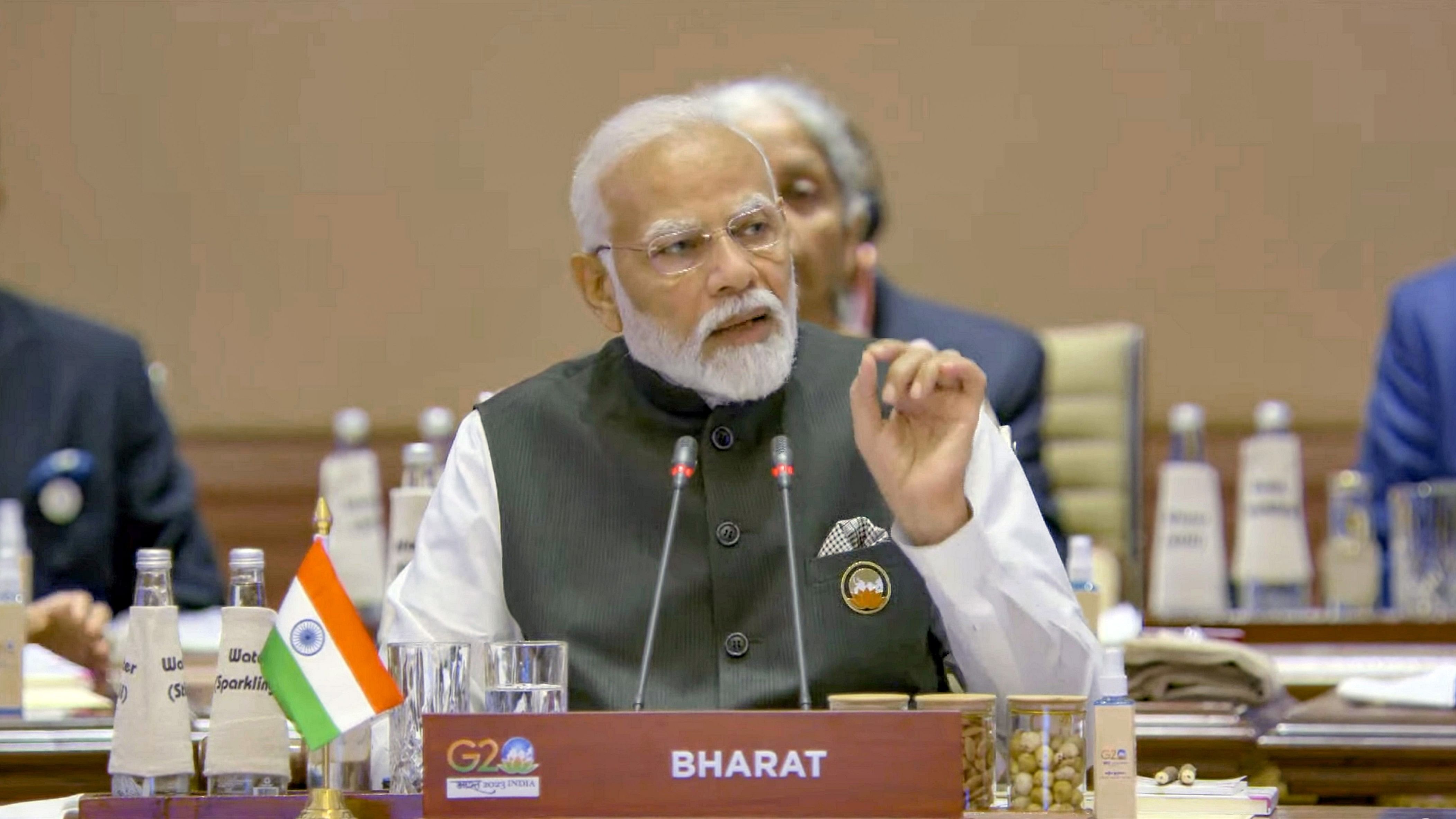
Prime Minister Narendra Modi addresses the session-1 on 'One Earth' during the G20 Summit 2023 at the Bharat Mandapam convention center for, in New Delhi.
Credit: PTI Photo
Prime Minister Narendra Modi on Saturday stressed respect for the sovereignty of all nations as he joined United States President Joe Biden and other leaders to announce a sea-land connectivity project linking India with the Middle East and Europe in an apparent move to counter the controversial Belt and Road Initiative of China.
The ambitious India-Middle East-Europe Economic Corridor or the IMEC was announced on the sideline of the 18th G20 summit, which the prime minister is hosting at Bharat Mandapam in New Delhi.
The proposed IMEC will comprise an eastern corridor connecting India to the Gulf region and a northern corridor connecting the Gulf region to Europe. It will include a railway and ship-rail transit network and road transport routes, according to the Ministry of External Affairs.
India will be linked to Europe by a railway line and existing ports through UAE, Saudi Arabia, Jordan, and Israel. It will generate economic growth while incentivising new investments and the creation of quality jobs. The corridor will connect the two continents to commercial hubs and facilitate the development and export of clean energy. It will support existing trade and manufacturing synergies and strengthen food security and supply chains.
It will also link energy grids and telecommunication lines through undersea cables to expand reliable access to electricity, enabling innovation of advanced clean energy technology and connecting the communities to secure and stable Internet.
Modi and Biden were joined by several other leaders to announce the connectivity initiative –Crown Prince of Saudi Arabia, Mohammed bin Salman Al Saud, President of the United Arab Emirates Mohammed bin Zayed Al Nahyan, French President Emmanuel Macron, German Chancellor Olaf Scholz, European Commission President Ursula von der Leyen, Italian Prime Minister Giorgia Meloni and World Bank chief Ajay Banga.
They also announced the launch of the Partnership for Global Infrastructure and Investment (PGII).
The PGII is a developmental initiative aimed at narrowing the infrastructure gap in developing countries as well as helping accelerate progress on Sustainable Development Goals, adopted by the United Nations, around the world.
The leaders of India, Saudi Arabia, Italy, Germany, France, the UAE, the US and the European Union signed a Memorandum of Understanding (MoU) to establish the economic corridor.
The PGII and the IMEC appear to be a move by India, the US and the rest of the West to rope in Saudi Arabia and the UAE to create an alternative to China’s ambitious cross-continental Belt and Road Initiative (BRI), which President Xi Jinping launched a few years back but triggered controversy due to the communist country’s predatory lending practices that landed several small and low-income nations in debt traps.
“India does not limit connectivity into regional borders. It has been India's priority to increase connectivity with all regions. We believe that connectivity between various countries is not only a source of increasing trade but also for strengthening mutual trust,” said the prime minister, adding: “It is important to keep in mind certain aspects while promoting connectivity initiatives such as adhering to international norms and rules.”
Modi stressed respecting the sovereignty and territorial integrity of all nations while promoting such initiatives.
The prime minister said that the IMEC would become an effective medium for economic integration of India, the Middle East and Europe in the times to come.
"As a key part of this corridor, we are investing in ships and rails that extend from India to Europe connected by the UAE, Saudi Arabia, Jordan and Israel. It will make it far easier to trade,” Biden said, calling the IMEC “a big deal”. "We need to maximize the impacts of our investments. That's why a few months ago, I announced that the US will work with our partners to invest in economic corridors. That means we're focusing on regional infrastructure projects that deliver results across multiple countries and multiple sectors.”
“This is a game-changing regional investment,” said the US president.
India is likely to try to maintain a balance between its connectivity projects with Russia and Iran with the newly envisaged move with the US, UAE and Saudi Arabia.
India is participating in the development of the first phase of Shahid Behesti Port in Chabahar in cooperation with Iran. The port opens up a sea-land connectivity between India and Afghanistan as well as Central Asia and beyond, bypassing Pakistan. The India Ports Global Limited took over port operations at the Shaheed Beheshti Port in Chabahar in December 2018 and has been handling cargo since then. Afghanistan also started using the port facility to send its first export consignment to India.
India, Russia and Iran had jointly conceived the International North-South Transport Corridor in September 2000 as a multi-modal transportation corridor, which would link the Indian Ocean and the Persian Gulf with the Caspian Sea through Iran and move onward to North Europe via Russia. Belarus, Kazakhstan, Tajikistan, Oman, Armenia, Syria, Azerbaijan, Turkey, Ukraine and Kyrgyzstan joined the ambitious project later. Bulgaria joined the bloc as an observer.
